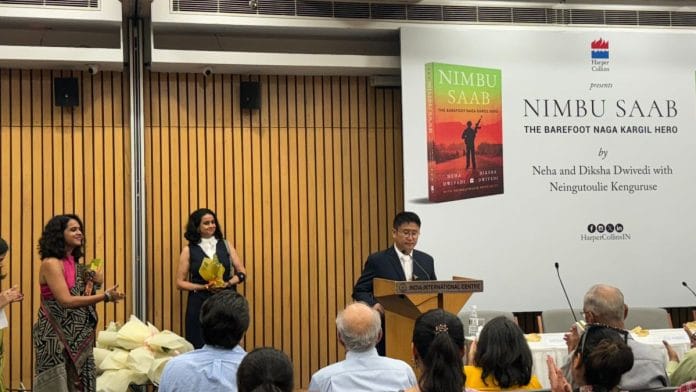New Delhi: It was 29 June 1999. The bullet had hit Captain Nimbu’s abdomen, and he began bleeding profusely. But this did not deter him from marching forward to lead his men, the Rajputana Rifles. Just as the men of Platoon 10 of D Company of 2 Raj Rif were about to attain victory, another bullet hit the Captain’s eye, causing him to fall from the top of Lone Hill in Kargil, 200 feet down.
His men, all of whom, had slung their shoes around their necks, roared, “Nimbu saab, yeh aapki jeet hai, yeh aapki hill hai” (Nimbu sir, this win is yours, this hill is yours). All of them had trekked the hills barefoot to attack the enemy.
This is how Captain Neikezhakuo Kenguruse from a small town in Nagaland, laid down his life during the Kargil War in 1999. He was fondly known as Nimbu Saab—since his fellow men found it difficult to pronounce his name. He was posthumously awarded the Maha Vir Chakra, India’s second-highest gallantry award, for his role in the Kargil War.
His brother, Neingutoulie Kenguruse, also known as Atuloie, reminisced about his brother’s sacrifice at Kamala Devi Hall at the India International Centre (IIC) in Delhi. Atuloie was at IIC on 23 July to launch a book on his brother’s life titled Nimbu Saab: The Barefoot Naga Kargil Hero. The co-authors of the book Neha Dwivedi and Diksha Dwivedi were also present.
The timing of the book launch is significant as India celebrates the 25th anniversary of Kargil Vijay Diwas—a day that commemorates the victory of the Indian Armed Forces over Pakistan in the 1999 Kargil War.
“I wish my brother had survived for 15 minutes more to witness this hard-earned triumph. All these years, his fellow army men told me that Neibu [what his family called him] knew the hills like the back of his hand. He would know which route to follow. The hills took him,” said Atuloie, as the teary-eyed audience clapped.
The book launch saw actress Gul Panag, daughter of retired Lieutenant General Harcharanjit Singh Panag of the Indian Army, and defence journalist Rahul Singh as special guests.
The book offers insight into who Neikezhakuo Kenguruse was beyond his uniform.
“My brother Neikezhakuo was a different person. He was respectful to elders, humorous to his friends, and strict to his siblings—that is me and 13 others,” said Atuloie as the audience broke into laughter.
Also read: How Naga Kargil hero Neikezhakuo Kengurüse became his Company’s Nimbu Saab
Some survive to tell the story
The Dwivedi sisters met Atuloie for the first time at the 22nd annual commemoration ceremony of Kargil Vijay Diwas. Diksha’s previous book, Letters from Kargil (2017), featured letters written by Kargil war heroes to their family members. It was Nimbu Saab’s letters that struck her the most.
“I wanted to walk up to Atuloie and say that I had read every single one of his brother’s letters for my previous book and how I felt sorry that his brother’s story was not told yet,” said Diksha. The audience listened to her in rapt attention.
The sisters were at the ceremony as their father, Major CB Dwivedi, was also killed in action during the Kargil War. They were introduced to Atuloie by his brother’s then-regimental officer, Brigadier Mohit Saxena.
During the commemoration ceremony, a teary-eyed Saxena told Atuloie how he sometimes felt “it might have been better if he had not come back either.”
Atuloie quickly responded, “Some of us have to survive to tell the stories of those who cannot.” That’s when an unspoken deal was sealed between the Dwivedi sisters and Atuloie, leading to the creation of the book, the sisters said.
“Nimbu saab came from Nagaland. He had a full-blown career before joining the Army. He came for higher status and respect for his family. We tried to understand what drove Nimbu to scale up the mountains barefoot and take ‘that’ step,” said Neha, whose father posthumously received the Sena Medal.
Also read: Incompetent leaders sent Kargil soldiers to their deaths. Where is the accountability?
Juggling between loss and pride
The book launch was attended by family members of several other soldiers who laid down their lives in the line of duty, sharing their stories of loss, grief, and pride.
One of them was Rajat Rialch, brother of Captain Shailesh Rialch (Sena Medal), who laid down his life during a counter-insurgency operation in Kashmir. He was 23.
Rajat recalled receiving the dreadful call informing him of his younger brother’s death. Being a Pahadi from Himachal, Rajat said their community greatly values the uniform, but the news shook him to the core. Rajat’s first emotion was not of pride but of deep loss, a feeling that still lingers.
“We are told that we should be proud. The tussle between the loss and being proud is a big one. Being proud is secondary. Primary is losing someone,” said Rajat.
During the book discussion, Panag emphasised that we, as a nation, “should value armed forces not only during wars but always, because they are effectively at war.”
The stories continued as the hall resonated with memories of many Army men.
Vijender Thapar, brother of Captain Vijayant Thapar who died during the Kargil War, described the moment he learned of his brother’s death.
“The first feeling of tragedy is never sorrow; it is shock.”
“25 years later, whenever I go for a run, I still feel my brother running next to me. And just like in our teenage years, I would discuss my problems with him. He would always answer me. My elder brother, my companion, my best friend,” Thapar said as his voice broke.
(Edited by Theres Sudeep)






